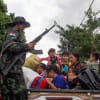Myanmar civil war deserves an intelligent response

Being concerned about the Myanmar conflict is understandable, but we cannot be fearful. The multifaceted issues posed by the civil war in our neighbouring country deserve an intelligent response. The situations in central Myanmar, in the marginal states, and in Arakan should be regarded separately from one another. For practical reasons, Bangladesh's approach to each of these situations must be different as well.
Although Bangladesh's focus seems to mainly centre on the war in Arakan, the situation in Chin is of import in terms of geopolitics. There are also similarities between the people in Chin and those in Bangladesh's Bandarban. The Chin National Front has already prepared a government and constitution for its region. Such an integrated position has put uncertainty into India's plans towards Thailand and Asean. This could surely get New Delhi to come to an understanding on this front. And since the Chin state borders Bangladesh, there is a need for us to communicate with them somehow.
In my capacity as a writer, I was able to speak to the CNF Vice-President Dr Sui Khar, who is responsible for Chin's negotiations with the Tatmadaw. He told me that they have a positive stance about the Rohingya's return to Myanmar, keeping intact their ethnic identity.
Right now, the Arakan Army is increasingly occupying the townships in northern Arakan such as Mrauk U and also Paletwa in Chin. Realistically, the AA could soon be in control of 70-80 percent of the area.
There are several questions ahead of Bangladesh in this regard. Would discussions be needed with the AA in doing business with Arakan? Would the issue of Rohingya repatriation also need to be discussed with the AA? Would the growing tensions between the AA and Tatmadaw result in more military and civilian infiltration into Bangladesh? As for the Rohingya organisations, such as ARSA and RSO, what should their actions be given the current situation, and what would their relation be like with the junta and the AA? If the rebels in Arakan are able to completely take over, what should Bangladesh's position be in that case? It should be noted that the Arakan Army does not consider the Rohingya a separate nation. But it does support the return of the Rohingya to Arakan with citizen rights. This was confirmed to us by AA chief General Twan Mrat Naing himself in 2022.
Dr Khar said when the NUG began the Spring Revolution in 2021, they tried to contact the Bangladesh government. I don't know what the government's response was. But the NUG, CNF, and AA all believe that Bangladesh's Myanmar policy, Arakan policy, and Chin policy should all be reviewed. Dr Khar also said that by the end of this year, the Myanmar military will be completely depleted and the changing situation of central Burma and peripheral areas requires a rethinking of Bangladesh's policy.
Besides China, neighbouring India is also closely monitoring the situation in Burma. India shares important borders with Chin and has important investments in Arakan. The situations in these two provinces prompted India to announce the fencing of the Myanmar-India border. But the Zou and Naga peoples are on both sides of this border and are therefore against this fencing. This could be another matter of dispute in the region in the coming days. And since there are Zou people in Bangladesh, too, it demands our attention.
All in all, given the evolving situation, it is crucial for Bangladesh to start recognising the diverse political and military elements of this neighbouring country.
Altaf Parvez is a researcher of history, and has authored 'Burma: Jatigoto Shonghater Shaat Doshok.'
Views expressed in this article are the author's own.
Follow The Daily Star Opinion on Facebook for the latest opinions, commentaries and analyses by experts and professionals. To contribute your article or letter to The Daily Star Opinion, see our guidelines for submission.

 For all latest news, follow The Daily Star's Google News channel.
For all latest news, follow The Daily Star's Google News channel. 








Comments